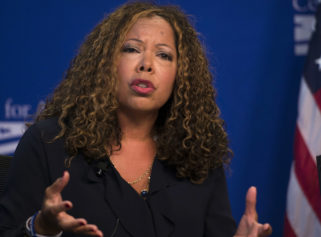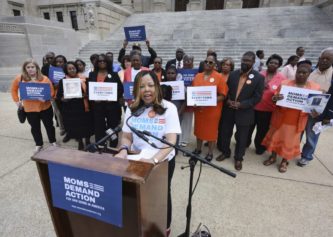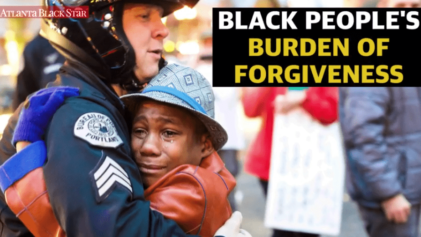
That was the question Davis’ father tantalizingly dangled after the jury verdict.
According to Ron Davis, the jury verdict made Jacksonville “a shining example that you could have a jury made of mostly white people, white men,” that can deliver justice in a case where a white man is on trial for killing a Black male.
“Hopefully,” Davis said, “this is a start where we don’t have to look at the makeup of a jury anymore.”
Dunn’s jury was made up of 10 whites and two Blacks, but took just five hours to reach a guilty verdict.
At the end of a summer that appeared to represent a huge step backwards in America’s racial journey, with police officers seemingly gunning down unarmed Black men every other day, it is tempting to view the verdict as an indicator that perhaps white people are closer to understanding Black suffering than the summer’s events would have us believe.
Natalie Jackson, an attorney representing the family of slain teen Trayvon Martin, was clearly feeling hopeful after the verdict, telling reporters it represents progress in an ongoing fight for “blind justice, for equal justice.”
“It’s small progress, but it’s progress,” she said. “And I’m so happy for his family because even though they knew their son was a victim, I think the jury validated it.”
In 2012, Dunn shot into an SUV full of teenagers at a Jacksonville gas station after an argument over the music coming from the teens’ vehicle.
There was widespread anger after Dunn’s first trial in February, when a jury deliberated for more than 30 hours and found Dunn guilty of three counts of attempted murder but couldn’t agree on the murder charge — essentially finding the 47-year-old white man guilty of attempting to kill the teens, but not guilty of succeeding in killing Davis.
The jury verdict became a part of the evidence cited by African-Americans — in addition to the acquittal of George Zimmerman for killing 17-year-old Trayvon Martin — that it is extremely difficult for African-Americans to find justice through the American court system.
Before the trial, Dunn’s new lawyer, Waffa Hanania, thought it would be impossible to seat an impartial jury in Jacksonville and tried to get the trial moved away. But Judge Russell Healey denied the motion and said he would reconsider if jury selection proved impossible.
The verdict in Jacksonville might cast the deliberations in St. Louis in a different light. An overwhelmingly white grand jury in St. Louis County is currently hearing evidence to determine whether it will charge Ferguson, Missouri, police officer Darren Wilson in the death of unarmed teen Michael Brown. But before we draw too many inferences from the Jacksonville verdict, consider the results of a St. Louis County poll after the Brown killing: A substantial majority of white people read and watched weeks of detailed coverage of Ferguson police officer Wilson shooting unarmed Black teen Michael Brown multiple times, apparently even after Brown’s hands were raised in surrender, and still concluded that Wilson was justified in his actions.
A full 62 percent of white respondents in a Remington Research Group poll said the shooting of Brown was justified, while 38 percent of whites said the shooting wasn’t justified. In contrast, only 35 percent of African-Americans said the shooting was justified, while 65 percent said it was not.
As for the second trial, State Attorney Angela Corey hammered away at Dunn’s actions after the shooting, including leaving the scene without calling 911. She claims they were clear evidence of guilt. Dunn fled the scene and never called the police — not even after he learned that someone had died in the shooting. Dunn and his then-fiancée drove to their hotel where he walked the dog, poured himself a rum and Coke and ordered a pizza.
He got in his car the next day to drive home to Satellite Beach, a 2 1/2-hour trip. He was arrested there by police.
“If you are fighting to defend your life, you don’t then run from the scene,” Corey said. “We believed the flight from prosecution to be the most striking thing about the case.”
Dunn faces a sentence of life in prison without parole for the murder of Davis, plus 60 years in prison for his February convictions.


